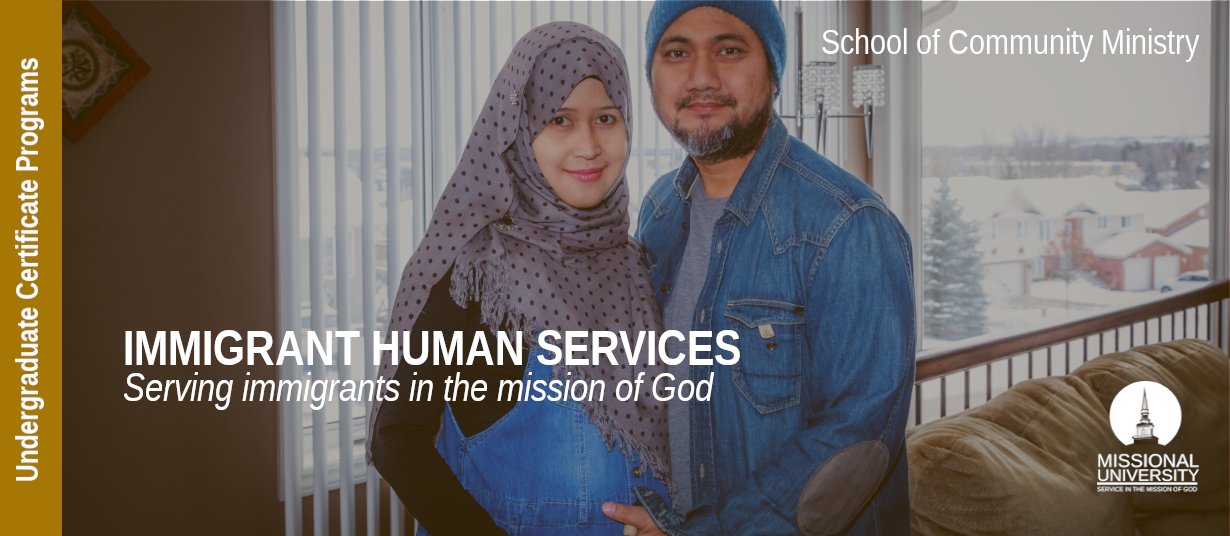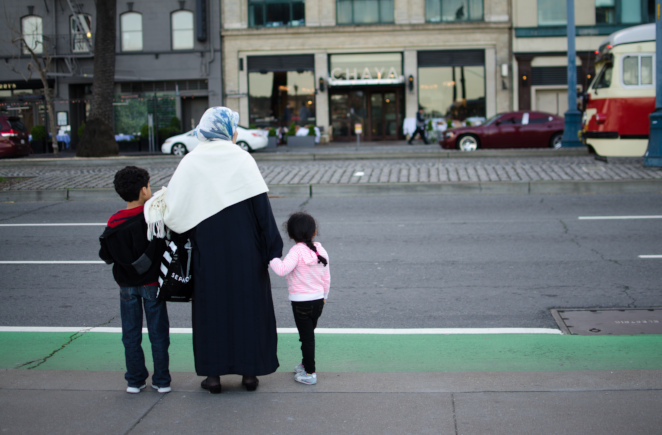
Online Undergraduate Certificate in
Immigrant Human Services
⚜ Rarely Offered in Christian Universities, Bible Colleges or Seminaries
Expand Your Missional Service Today!
REQUEST INFORMATION
Ready to learn more about the
Undergraduate Certificate in
Immigrant Human Services?
LEARN MORE NOW
The Undergraduate Certificate in Immigrant Human Services offers community ministry practitioners, church planters, pastors, immigration caseworkers, consultants and counselors; refugee case managers, rescue coordinators, and resettlement workers; refugee ministry coordinators, and other human service professionals the following;
-
- a theological understanding of immigration, refuge and justice
- the capacity of spiritual caregiving for community transformation among resistent populations
- a grasp of the causes and consequences of forced and voluntary migration
- an analysis of the identity formation and adaptation issues of diaspora peoples
- cultural competencies in multicultural interventions with immigrant individuals, families, organizations and communities
- how to evaluate the impact of immigration on families and children and implications for human service providers
- how to identify the contextual factors and epidemiologic mental and physical health issues of displaced persons
- how to leverage the strengths, cultural resources and natural support systems for immigrant populations
Human services is an interdisciplinary field of study with the objective of meeting human needs through an applied knowledge base, focusing on prevention as well as remediation of problems, and maintaining a commitment to improving the overall quality of life of service populations. The process involves the study of social technologies (practice methods, models, and theories), service technologies (programs, organizations, and systems), and scientific innovations that are designed to ameliorate problems and enhance the quality of life of individuals, families and communities to improve the delivery of service with better coordination, accessibility and accountability. The Undergraduate Certificate in Immigrant Human Services equips students to serve diaspora communities holistically by demonstrating the love of God among immigrant groups through the application of appropriate social and service technologies and the innovative delivery of diaspora services.
Program Features
-
Integrated practicums allow you to gain valuable real-world experience
-
Learn from academic practitioners from around the world
-
Credits earned in this certificate program can apply to a Missional University Bachelor degree program
Course Effort
Course Length
Credits Required
Program Cost
What Will I Study?
We offer the most comprehensive approach to serving immigrants in the mission of God.
An examination of the phenomenon of increasing global migration of people from both internal and external perspectives. The student will explore a theological understanding of how God has worked toward, with and through people in diaspora in their biblical and historical contexts. Application will be made to contemporary immigration, refugee, and justice issues.
What does it mean to be a spiritual caregiver? How does one provide spiritual care in a world increasingly resistant to organized religion and institutional structures? This course engages what it means to be an instrument of Christ in a world with increasing meaninglessness and hopelessness. In this course, students will examine the biblical foundations of spiritual caregiving, the interpersonal development of spiritual caregivers, and the capacity of spiritual caregiving to generate personal and societal transformation. This foundational course prepares spiritual caregivers to go on towards a caregiving specialty.
Focus on issues such as the nexus between forced and voluntary migration, the Mediterranean refugee crisis, transition from relief to development, internally displaced populations, refugees/displaced persons, immigration patterns, refugee protection, and national security issues. Particular attention to creating contextually-appropriate missional responses for various refugee and voluntary migration scenarios.
Exploration of challenges facing today's diaspora sojourners: How adaptation and entry occur, and how the diasporic self influences and guides in integrating identity formation and acculturation to a local context. Using case studies, interviews, group discussions, multi-media, and research assignments on biblical and secular diasporas, the student will gain knowledge and insight on how to practically interact with diaspora peoples.
This course presents the knowledge, awareness, and skills to support necessary to be a culturally competent social worker. Issues presented will involve: multidimensional aspects of race/ethnicity, gender, sexual orientation, socioeconomic status and different abilities as well as other multicultural issues in interventions with individuals, families, organizations, and communities.
Exploration of factors underlying migration of peoples throughout the world and the implications for providing services to migrant communities. It focuses on the impact of immigration on families and children in immigrant communities. Upon completion, student will develop an awareness and respect for immigrant family issues and establish skills in the field of practice with immigrants.
An introduction to topics in mental & physical health for immigrant and migratory populations. Emphasis will be placed on understanding the contextual factors and epidemiologic issues of displaced persons. Students will develop an integrated approach to address the mental and physical health of immigrant communities.
An analysis of emerging issues of migration, social and psychological locations, acculturation and its impact on social work practice. Students will learn about potential problems facing immigrants and refugees as they seek to rebuild their lives. Students will learn to recognize their strengths, cultural resources and natural support systems.
Optional Additional Courses:
This course focuses on interventions with older adults at both the micro and macro level. Emphasis will be placed upon theories of human development related to aging and the physiological, psychological, and social changes. Care-giving demands, legal/financial planning, abuse and neglect, sexuality & intimacy, and loss and grief will be addressed.
How peoples relate to each another can have far-reaching implications. This is especially true when interactions are not only individual but within larger groups and communities connected to more than one geographical location. This course seeks to understand the value and power of social capital (trust in relationships, motivators for participation, what causes groups/communities to rise and fall, etc) specific to diaspora theory. The student will gain fundamental knowledge for understanding and engagement of diaspora peoples through the lens of social capital.
Preparation to lead displaced people by examining reasons for immigration and physical, emotional and spiritual issues related to relocation. Explores the differences between refugees for economic reasons and those driven out by persecution or war. Examines contemporary experience, including how technology retains connections and potential ways to grow in community.
When Can I Get Started?
We offer multiple start dates each year to give you flexibility in your education, life and work schedules.
JANUARY
MARCH
MAY
AUGUST
OCTOBER
A Career in Transforming Communities
Is this Your Mission?
Community Ministry Practitioner, Immigration Advisor, Immigration Caseworker, Immigration Consultant, Immigration Coordinator, Immigration Counselor, Immigration Specialist, Immigrant Rights Organizer, Immigration Services Manager, Immigration Services and Education Organizer, Refugee Foster Care Case Manager, Refugee Ministry Coordinator, Refugee Rescue Coordinator, Refugee Resettlement Case Manager, Refugee Services Case Manager, Refugee Support Caseworker, Refugee Worker
Request Information Now
How Much Will it Cost?
We offer tuition based upon country of residence. According to the Human Development Index, all countries around the world fall into one of four categories:
-
(Tier 1) - Very High Human Development
-
(Tier 2) High Human Development
-
(Tier 3) Medium Human Development
-
(Tier 4) Low Human Development
Our tiered global tuition makes higher education affordable for everyone world wide.

TIER COUNTRIES
100% Tuition
$295
per credit hour
3 credit course
$885

TIER COUNTRIES
80% Tuition
$236
per credit hour
3 credit course
$708

TIER COUNTRIES
60% Tuition
$177
per credit hour
3 credit course
$531

TIER COUNTRIES
40% Tuition
$118
per credit hour
3 credit course
$354
Tiered tuition based on country of origin and scholarships available. Find your country of residence here for more information.
Tuition may be further reduced by participating in the Sponsorship Program.
